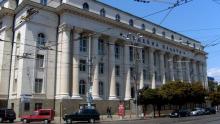It is no secret that in Bulgaria very often Euro funds are granted to shady projects in which the prices of the products or services needed for its execution are inflated so people responsible for it to enrich themselves.
Another example of EU funds spent on an absurd project (rather absurd figures in it) was the project for the Sofia City Court – an institution which gets itself mixed in scandals almost every week.
Just two months ago Sofia City Court (SCC) acquired more than a quarter million euros from EU funds for "good governance". The project was funded under the Operational Programme "Administrative Capacity" (OPAC) and was worth 693,000 BGN. Its aim was "to increase effectiveness and efficiency in the work of SCC by applying the principles of good governance and the creation of transparency in the work of the court". The problem was that the project was kept secret by the Bulgarian Medias and by the most magistrates working in this institution. The people involved in it were not many and it is apparently a good reason to keep it secret from the public and their colleagues.
That major project involved creation of "manuals and regulations," including instructions for working with a software for random distribution of court cases. It turned out that the software in question did not distribute the court cases in a random manner. The project included trips abroad for "studying best practices in foreign courts", secret Round-table discussions, bogus analysis, and fictive press conferences.
The project started in November 2012. As we mentioned it cost 693,000 BGN, and this amount included: preparing an action plan – 45,000, manual for the court functioning and internal rules for random distribution of court cases – 227,000, strategy for organizational development – 50,000, studying the best practices – 63,000, analysis of the internal organization of the court – 55,000, six roundtables and training – 96,000, manufacturing of 1000 folders and pens – 7,500, two trips abroad – 18,400, updating the website of the SCC – 20,500, and other costs 150,600 to complete full value of the grant.
The main participants in project were Vladimira Yaneva, Bogdana Zhelyavska and Petya Kruncheva.
Vladimira Yaneva received 14,000 BGN for her work and for gathering a team for the project and her deputy Bogdana Zhelyavska as a project coordinator took 11,000. Over the next two years they were supposed to work extra 80 hours for completing the project.
Another participant was Maria Zafirova which was an employee of the Council of Ministers and was the main coordinator of the project. It turned out that this woman didn’t have any minute of spare time, because in addition to her job she worked as a coordinator for another two projects for the Bulgarian judiciary system funded by OPAC – first for the Supreme Administrative Court and the other for the Supreme Judicial Council. Although we were talking about eighty hours per month for each project (for which she got paid and projects were overlapping) Maria Zafirova commented that there was no legal obstacle. OPAC confirmed her words. If we multiply 80 hour by 3 projects it amounted to 240 hours which was 30 working days without a day off and when we added the hours from her other job, it turned out that Zafirova never sleeped.
For the analysis of best practices in court were provided 63,000 BGN. Therefor in 2013 the chairperson of the court Vladimira Yaneva and her deputy Bogdana Zhelyavska with another three people went on a visit to Spain to study the "best practices" in the management of Madrid courts. Later they made another visit, this time in Germany, with the chairperson of Criminal Department Petya Kruncheva. The budget of these visits amounted to 36,000, bringing the total for these activities to 100,000 BGN.
The analysis and the implementation of other services like assessment of the internal organization of the court, a detailed study of the mechanisms for oversight and effective case management, preparation of a report identifying weaknesses and opportunities for improvements, and strategy for organizational development were assigned to the company “SGS: strategy, flexibility, cooperation”. It included "Bulgarian consultancy organization" and "AMI International". The contract, which was signed for their consulting services on the project, was worth 370,000 BGN.
It turned out that it was almost impossible to get access to the analysis of best practices in court because Sofia City Court and the contractor refused to provide access to it, but one way or another the truth always comes out. Although representatives of the project (including managers and Zhelyavska Yaneva) had been in Spain to explore best practices, Spain was mentioned in the document exactly twice.
The major part of the document was about the random distribution of court cases. It also presented comparison tables from which it could be concluded that the software used in Sofia City Court distributes law cases evenly (unlike Germany, Estonia, and Portugal), it does not allow intentional interference, precludes forgery, and it also generates a protocol (unlike Denmark where there were not such guarantees) . Another interesting conclusion could be made reading the document was that there were clear rules about distributing the law cases in SSC unlike the court software in UK and Portugal which could be messed with. The analysis showed that the program LawChoice was trusted by the Bulgarian judges, which was not the case with the programs in Italy, Portugal, UK, and Denmark. Unlike Italy and Estonia, Bulgarian society “believed” that the court cases are randomly distributed.
Further comments were unnecessary. Only two months ago, these conclusions were refuted by numerous analysis and evidence of experts, NGOs and even the European Commission itself, which posed the problem about the unreliable software Lawchoice in monitoring reports.
Another interesting fact of this "deep" comparative analysis of 19 pages was that there were several documents with internal rules, which should be the responsibility of the management of the court and it was not understandable why they were paid for from the EU funds. On the top of that it turned out that these rules were secret and the court refused to provide them. It was promised that the rules will be uploaded to the internal server when they were ready (the project was completed three months ago, but the judges of the municipal court commented that they had not been uploaded yet).
A curious part of the project was the reconstruction of the Sofia City Court website. Somehow SCC refused to give information about the value of the contract for the "reconstruction", but the contractors "Aysidzhen Corporation" were kind enough to enlighten us about the transaction of 27,000 BGN without VAT. According to the information released by the court, after the reconstruction the website was already accessible for people with impaired vision, there was also an English version of the site and a forum was installed.
But the facts were different. There was no English version of the website. A multilingual feature was installed but nothing was translated. If some English speaking foreigner opened the site, she or he would find out that during the last summer, due to inventorization, the court would not work, followed by a link to a Bulgarian pdf file. If the foreigner wanted to use the contact page, she or he would open an empty page.
The functionality about people with impaired vision consisted of small JavaScript for increasing the font size. The installed forum was open source and it takes no longer than two hours for the installation. On the top of that the forum was empty because it was very difficult to be found. However in the analysis of best practices it was claimed that only in Sofia City Court there was a forum for a real time discussion of cases.
Claims about optimization of the site were irrelevant, since the last publication in it was from the end of the last year.
The wonderful project ended on November 6th, 2014.
At a press conference Vladimira Yaneva said: "I wish to thank the whole team who worked on the project objectives, which a year and a half ago were only ideas, but now they are facts on which we will continue to work and we will launch more projects." On that press conference, around fifty people were supposed to be present, but only two of the four invited Medias responded. For that event were provided 7,000 BGN.
Head office of OPAC in the Ministry Of Finance commented that there were no irregularities found in the project. Half the amount for the project had been paid off and only some of the costs were not approved because of different reasons. One of these reasons was that the team didn’t adhere to the rules of the program when claiming the working hours. For example Bogdana Zhelyavska and Vladimira Yaneva requested that the time spent in Spain, to be accepted as work on the project.
This was only one example of a bogus project where the reported results were fictitious. There is no need to comment on the project execution because the results are visible and tragic. Here we have a poorly working institution which irresponsibly spends public money and EU funds. Here we have to mention that this project seems negligible for the multi-million infrastructural projects, where results are no better. The only difference is that infrastructural projects in Bulgaria digest millions of public funds.










Add new comment